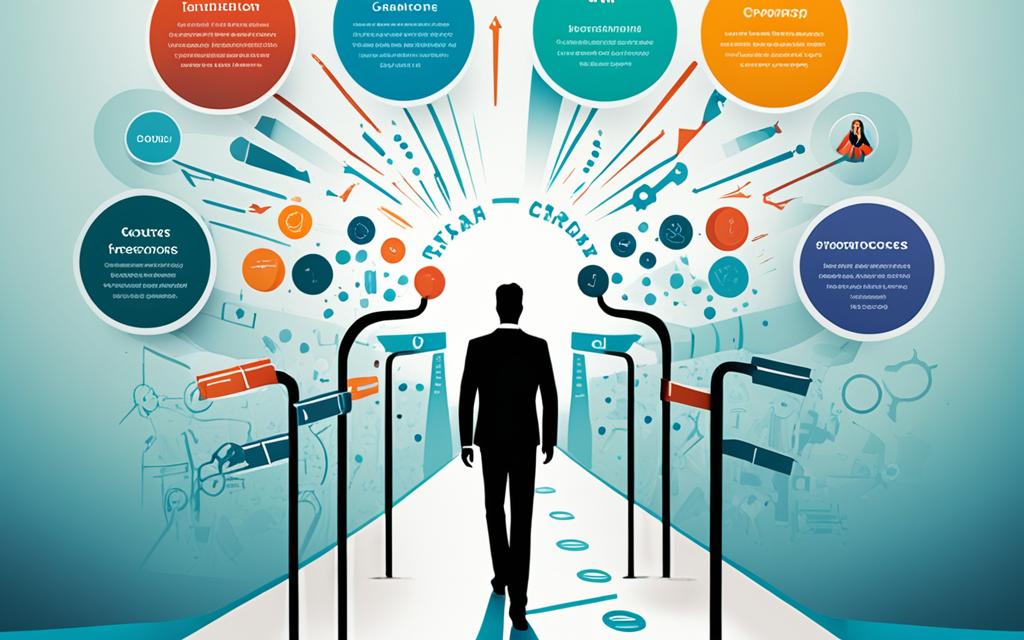Unlock Personal Growth with Solution-Focused Therapy
Begin a life-changing journey in personal development with solution-focused therapy. It’s a type of brief therapy that focuses on your goals and strengths. It helps you make positive changes that last.
Key Takeaways
- Solution-focused therapy is a short-term, goal-oriented form of counseling that emphasizes your existing strengths and resources.
- Instead of dwelling on past problems, this approach focuses on building practical solutions for a desired future.
- Through a collaborative therapist-client relationship, you take an active role in your personal growth journey.
- Solution-focused therapy cultivates a solution-oriented mindset, enabling you to reframe challenges as opportunities.
- By setting achievable goals and celebrating successes, you experience increased self-confidence and resilience.
What is Solution-Focused Therapy?
Solution-focused therapy is a modern future-focused counseling method. It looks at developing problem-solving strategies instead of focusing on the past. This method is all about finding and using your strengths to make positive changes.
A Brief Overview of Solution-Focused Therapy
In the 1980s, Steve de Shazer and Insoo Kim Berg created solution-focused therapy. It’s known for being quicker than traditional talk therapy. This method helps you imagine your better future and work with your therapist to make it real.
The Core Principles of Solution-Focused Therapy
Solution-focused therapy is built on a few key ideas:
- Building on your existing strengths and resources
- Focusing on achievable goals and desired outcomes
- Emphasizing what is working rather than dwelling on problems
- Utilizing empowerment techniques to foster self-discovery and personal growth
Distinguishing Solution-Focused Therapy from Traditional Counseling
In contrast to digging into the past, solution-focused therapy focuses on now and tomorrow. It really stands out by working on solutions instead of just talking about problems. This method promotes a positive way of thinking to help you move forward.
| Traditional Counseling | Solution-Focused Therapy |
|---|---|
| Focuses on analyzing past problems | Concentrates on building solutions for the future |
| Explores root causes and underlying issues | Builds on existing strengths and resources |
| Emphasizes problem identification | Emphasizes goal-setting and solution-building |
| Typically involves long-term therapy | Utilizes a brief therapy approach |
Personal Growth Through Solution-Focused Therapy
Solution-focused therapy helps you grow by using your strengths and resources. It doesn’t just look at problems. Instead, it encourages you to find and work on solutions. This approach helps you develop a positive mindset focused on growth.
How Solution-Focused Therapy Promotes Personal Growth
This therapy highlights what you’re already good at. It sees your strengths and helps you use them for change. You and your therapist work together. This partnership makes you actively involved in your own progress.
The Benefits of a Solution-Oriented Mindset
Having a solution-focused mind is essential for growing. It helps you see challenges as chances to improve. You’ll learn to set goals that move you toward what you want.
The solutions to life’s challenges often lie within us, waiting to be discovered and embraced.
This mindset brings more confidence, wisdom, and purpose. It’s not just about growing. It’s also about living a better life overall.
Embracing a Strengths-Based Approach
At the heart of solution-focused therapy is recognizing and enhancing an individual’s natural skills. This approach helps you see and use your special abilities. You begin to believe in your power to make positive changes.
Identifying and Leveraging Your Strengths
Understanding your strengths is the first step. This includes discovering which skills and qualities have helped you in the past. It makes you more aware of what you’re good at.
Solution-focused therapy gives you the tools to make the most of these strengths. You use them to face current challenges. This boosts your confidence and helps you grow. You focus on what you’re good at, not what you lack.
The Power of Positive Psychology
The strengths-based approach is rooted in positive psychology. It aims to build well-being by highlighting strengths and good feelings. Positive psychology shows that by enhancing our strengths, we lead better lives.
Solution-focused therapy embraces these ideas. It helps you see problems as chances to grow. By using your strengths, you get stronger and more proactive in facing life’s challenges.
The greatest glory in living lies not in never falling, but in rising every time we fall. – Nelson Mandela
Taking a strengths-based approach changes how you see life’s hurdles. It equips you to find and apply your unique abilities, leading to more growth and fulfillment in your life.
Goal-Oriented Therapy for Lasting Change
Solution-focused therapy helps you set and reach meaningful goals. You work with your therapist to choose goals that matter to you most. This way, you lead your own path towards growth and change that lasts.
Setting Achievable and Meaningful Goals
In this therapy, you and your therapist team up to set goals. You pick what you want and figure out how to get there. This makes sure your goals are both doable and important, setting you up for success and feeling good about it.
Tracking Progress and Celebrating Successes
Keeping track of how you’re doing and celebrating wins is key in goal-oriented therapy. You and your therapist will make a plan to check off milestones, no matter how big or small. This helps you feel proud of your work and keeps you going.
This type of therapy teaches you how to solve problems and keep moving forward. It gives you the skills to make changes that last, even after therapy ends. So, you can keep getting better on your own.
Solution-Building: A Future-Focused Perspective
Solution-focused therapy aims to look ahead. It helps people see the future they want and find ways to get there. Instead of focusing on past troubles, this kind of therapy looks at what’s strong and good now. It builds on those positives.
Envisioning Your Desired Future
The first step is to know what you want and imagine your ideal future. Your therapist will guide you. They will help you set goals and see how you can make positive changes. This helps move your focus from problems to working on your dreams.

Developing Practical Solutions
Once you can picture your future, therapy teaches you how to solve problems and make real plans. You’ll use your skills and what you already have to overcome challenges. With this help, you start seeing hurdles as ways to learn and grow. What you come up with will be just right for reaching your goals. This makes you feel stronger and ready to steer your own path.
Therapy also helps you check your options and see what will work best. Your therapist will guide you. They support you in focusing on your future. This way, you build strength to make changes that stick.
Problem-Solving Strategies for Personal Growth
Solution-focused therapy gives you tools for problem-solving strategies that help in your personal growth. It focuses on turning challenges into chances for learning. This helps you face tough times as ways to become better and more resilient.
Reframing Challenges as Opportunities
Solution-focused therapy teaches you how to reframe problems. Instead of seeing hurdles as just problems, you start to view them as paths to grow and find out more about yourself. This new view lets you deal with challenges in a positive way. You can then work on solutions that push you in the direction of your dreams.
Cultivating a Growth Mindset
Cultivating a growth mindset is key to solving problems effectively. It’s about knowing that you can always get better and learn new things. With this mindset, you see challenges as stepping stones for your personal growth. They are not barriers but chances to enhance your skills and knowledge.
With solution-focused techniques, you learn how to solve your problems practically. This way, you can move towards your life goals. By tackling issues this way, you build confidence and a mindset focused on growth. It helps you steadily improve on your path to personal success.
Challenges are what make life interesting and overcoming them is what makes life meaningful. – Joshua J. Marine
Adopting a growth mindset and seeing problems as opportunities leads to problem-solving strategies that guide your personal growth. This approach teaches you how to turn problems into possibilities. This way, you step closer to becoming the best version of yourself.
Empowerment Techniques for Self-Discovery
Solution-focused therapy helps you start a journey to know yourself better and work on improving yourself. You get to play an active part in this process. This helps you feel in control of your life and its direction. The way this is done lets you use your own strengths and resilience. This boosts your self-esteem and belief in your power to make good changes.
Taking Ownership of Your Journey
Empowerment is key in solution-focused therapy. It encourages you to lead your path to growth, seeing hurdles as steps for finding yourself and transforming. Being part of this process gives you a stronger sense of control over where you’re heading in life.
The greatest discovery is not to find a new land, but to see the world with new eyes.
The relationship between you and the therapist brings out your deepest wishes, dreams, and inner strength. This partnership helps you find your real self. You start seeing your strengths and abilities in a new, more positive light.
Building Self-Confidence and Resilience
Techniques like creating solutions and focusing on your strengths prepare you for life’s tests. When you concentrate on what you’re good at, you build up self-belief. This allows you to face challenges in a different way. You’ll be determined to overcome them.
Also, this method helps you understand what truly matters to you. Knowing yourself better guides you towards becoming the best version of yourself. It ensures your growth journey stays true to who you really are.
What you learn in solution-focused therapy doesn’t stop when the sessions end. You can keep improving and facing new hurdles with confidence and self-awareness in your daily life.
Integrating Solution-Focused Therapy into Daily Life
Solution-focused therapy can do more than change your life during sessions. You can keep its power going by using its solution-focused principles every day. This helps you stay on track with your personal development.
Practical Applications of Solution-Focused Principles
Change how you face daily challenges with a solution-focused mindset. Stop focusing on problems. Instead, see your strengths and turn hurdles into chances to grow.
Find ways to solve issues by picturing what you want and working towards it.
- Set achievable goals that match your dreams.
- Be proud of small wins; they show you’re getting somewhere.
- Look for help and tools that push you past obstacles.
Maintaining Momentum and Sustaining Progress
Keep using solution-focused principles to get even better at life. Check your progress often, seeing the good changes you’ve made. This helps you move closer to your dream future.
“The key to success is to focus our conscious mind on things we desire, not things we fear.” – Brian Tracy
Stay focused on what you want and let go of fears and bad thoughts. Surrounding yourself with positive people helps keep you on track with solution-focused living.
Using solution-focused principles daily makes you strong and confident in the face of problems. This way, you keep growing personally for years to come. It turns therapy into a journey of self-discovery that never ends.
The Benefits of Solution-Focused Therapy
Solution-focused therapy is a powerful tool for change and positive thinking. It helps people look at their own strengths and solutions to problems. This can lead to a big jump in happiness and life satisfaction.
Improved Well-Being and Quality of Life
Solution-focused therapy really boosts well-being and life quality. It focuses on setting goals that are possible and cheering when those are met. This makes people more confident and happy. They start to see life’s challenges as opportunities to grow, not as problems holding them back.
Increased Self-Awareness and Personal Growth
This type of therapy helps people get to know themselves better. They find out what really matters to them and what they’re good at. This self-awareness is key for personal growth. It allows people to make choices that are true to themselves.
Adding solution-focused thinking to your day-to-day can really change your life. It’s all about using your strengths, setting goals you can reach, and staying positive. This way, you’re in charge of making your life better. You’ll feel happier, more aware of yourself, and full of purpose.
Finding a Solution-Focused Therapist
To begin a meaningful journey with solution-focused therapy, finding the right solution-focused therapist is key. These professionals are skilled in using a method that focuses on your strengths. They help you grow personally and feel more confident.
What to Look for in a Qualified Practitioner
Looking for a solution-focused therapist means finding someone with deep knowledge of this type of therapy. It’s important to choose someone with the right training and who belongs to respected groups. This shows they are serious about their work and can help you well.
Also, think about how they talk and work with their clients. A qualified practitioner should listen to you, get you, and help you feel stronger as you go through therapy.
Preparing for Your First Session
Before your first therapy session, get in the right mindset. Think about what you want to achieve and what challenges you face. The therapist wants to team up with you. So, feel free to ask questions and share your thoughts.
Starting with a solution-focused approach can make your therapeutic journey really effective. With a qualified practitioner supporting you, you can look ahead with clear goals and confidence. This is the first step towards a more focused and positive life.
Conclusion
Solution-focused therapy is a powerful way to grow personally. It helps you feel stronger and in control. This type of therapy is quick, focusing on what’s good about you. It teaches you to think about solutions and make changes that matter to you.
This therapy centers around building solutions. It looks at the future and helps you turn problems into chances to get better. You will learn to use what’s good in you to be stronger and more confident.
You’ll discover more about yourself and how to think positively. You get tools to solve problems and keep moving forward. By being in charge of your journey, you will feel more in control and able to keep growing, even after therapy.
FAQ
What is solution-focused therapy?
Solution-focused therapy helps people find ways to solve their problems. It is a short, goal-driven form of help. It looks at what is going well and how to make a good future.
How does solution-focused therapy promote personal growth?
It helps by looking at what’s working, not just problems. This way, people learn to use their strengths. They get better at making choices for their future.
What are the core principles of solution-focused therapy?
It highlights what people can do well. It praises the step-by-step progress. The focus is on making goals achievable.
How is solution-focused therapy different from traditional counseling?
It’s different because it looks to the future, not the past. It’s about finding positive ways to move forward, not just talking about problems.
How does solution-focused therapy incorporate a strengths-based approach?
It starts with what someone is already good at. Then, it helps them build on those abilities. This boosts their self-confidence.
How does positive psychology relate to solution-focused therapy?
Positive psychology means focusing on what’s good to feel better. Solution-focused therapy uses this idea. It helps people take on challenges with a positive mind.
How does goal-setting play a role in solution-focused therapy?
Setting clear goals is a big part of this therapy. It gives people a path for growth. This way, they can see how to make their future better.
What is solution-building in solution-focused therapy?
It’s about making a picture of the future and finding ways to get there. This method turns problems into steps forward. It teaches how to make changes for the better.
How does solution-focused therapy teach problem-solving strategies?
It shows how to see challenges as chances to learn. People learn to come up with their own solutions. This helps them reach their goals.
What empowerment techniques are used in solution-focused therapy?
It helps people become more in charge of their lives. They work closely with their therapist. This builds their confidence and boosts their own skills.
How can solution-focused principles be integrated into daily life?
These beliefs can be used in everyday situations. Like tackling problems with a positive mind. It’s about setting achievable goals and being happy about even small wins.
What are the benefits of solution-focused therapy?
It can bring a lot of good, like feeling happier and more confident. People also get to know themselves better and understand what they want from life.
How do I find a qualified solution-focused therapist?
Look for someone with special training in this area. Good therapists might have certain certifications. Also, pick someone you feel comfortable talking with.







